Report of the Regional Director 21 - Chapter 5
Report of the Regional Director - 2021 - Chapter 5
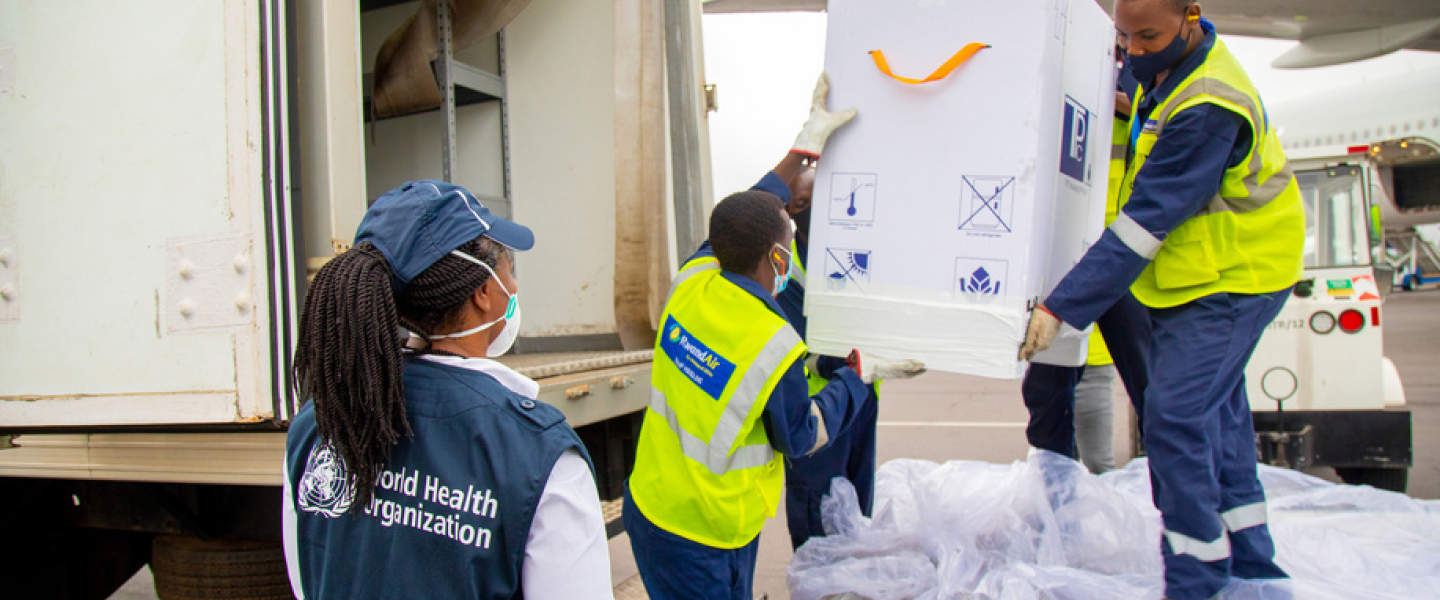
Communicating, coordinating
and delivering better
Advocacy, partnerships
and leadership for health
Expanding the scope and quality
of WHO communications
There is huge public interest and demand for evidence-based information on the pandemic in Africa. WHO has responded to this demand on several fronts, including by convening weekly press conferences with close to 50 reporters, and participating in over 600 media engagements.1 In addition, more than 50 press releases and 2500 unique articles quoting WHO experts in the African Region were published. Engagement with francophone media outlets has improved through active outreach for francophone journalists to direct questions to WHO experts.
To reach a wider audience, innovative partnerships are being pursued. For example, partnering with Facebook has yielded significant social media growth. The English Facebook account now boasts more than 1.6 million followers, up from 250 000 in June 2020, while the French account has more than 1.2 million followers. Followers on Twitter @WHOAFRO reached over 240 000 in June 2021, up from 120 000 in July 2020, while those on @MoetiTshidi have risen by approximately 10 000 to more than 35 000 in the same period.
Around 200 videos containing COVID-19 prevention messages were filmed and released in English and French with more than 8 million views. Impressive performance has also been registered on the WHO African Region website with page views increasing by 100% to reach 3 million compared to the previous year. Audience reach through Poppulo, the newsletter distribution platform, has also improved with over 1.5 million messages sent between July 2020 and June 2021 to health ministers, donors, embassies and media houses.
The weekly newsletter on COVID-19 and other key health topics has helped shine a spotlight on critical health topics and emergencies in the Region, recording an average opening rate of 55%, including forwarded messages.
To respond to the deluge of misinformation around COVID-19, WHO launched the Africa Infodemic Response Alliance (AIRA) with 14 partners including UN agencies and fact-checking organizations. In early 2021, Viral Facts, the public-facing brand of AIRA was also launched and has produced regular videos and other engaging content to debunk false information about COVID-19.
Countering COVID-19 myths and rumours
and sharing evidence-based information
In December 2020, WHO and partners, including fact-checking organizations, set up the Africa Infodemic Response Alliance (AIRA) to curb the spread of misinformation and improve access to trustworthy information in African countries.
Through the Alliance’s brand “Viral Facts Africa”, over 150 videos and other content have been shared on 70 social media channels, reaching more than 100 million views. In the months ahead, targeted campaigns and new content formats will be tested in countries to reach more specific audiences and increase engagement with local communities.
To step up visibility of WHO’s work at country level, communications focal points participated in refresher workshops on photography, continuous editorial support as well as training on social media management.
Broadening external relations and partnerships
In the African Region, WHO continues to invest in strengthening partnerships with the African Union and the regional economic communities, the African Development Bank, the UN Economic Commission for Africa (UNECA) and other UN agencies, and with governments and private sector development partners among others.
Approximately 60% of the funding for the COVID-19 response was raised at the regional and country levels as a result of efforts to strengthen partnerships.
The time devoted to due diligence and risk assessments for engagement with non-State actors has reduced dramatically from three weeks to around 36 hours. A quarterly forum has also been established to strengthen the support of non-State actors to national priorities. With these efforts, regional engagement with non-State actors has increased by 177% compared to a 77% increase in the previous reporting period.
Through the Harmonization for Health in Africa (HHA) mechanism, partner coordination has been enhanced to support health system strengthening and advocate for increased domestic resources for health. HHA partners jointly supported the implementation of national health plans, and developed a tool for assessing public-private collaboration and a practical guide on value for money in health. National supply chain systems and health security also received greater attention in 2020, given the pandemic context. In the coming year, the scale-up of digital health solutions and artificial intelligence will also be prioritized.
WHO’s governing bodies are leveraging innovative approaches to enhance their processes, including the creation of a regional accreditation mechanism for non-State actors not in official relations with WHO. This facilitated more systematic and effective participation of those actively engaged with WHO. During the two virtual sessions held in 2020, the Regional Committee for Africa adopted the 18 documents on the agenda through a written silence procedure.
Functional reforms for country-level impact
WHO’s country offices are at the forefront of the Organization’s policy and technical guidance to Member States. The results of WHO’s two-year functional reviews indicate the need for a 56% increase in human resources in WHO country offices in the Region. This will enable WHO to deliver on its mandate at country level, including carrying out functions expected by stakeholders. Insufficient funding is the main challenge affecting the implementation of these transformative changes.
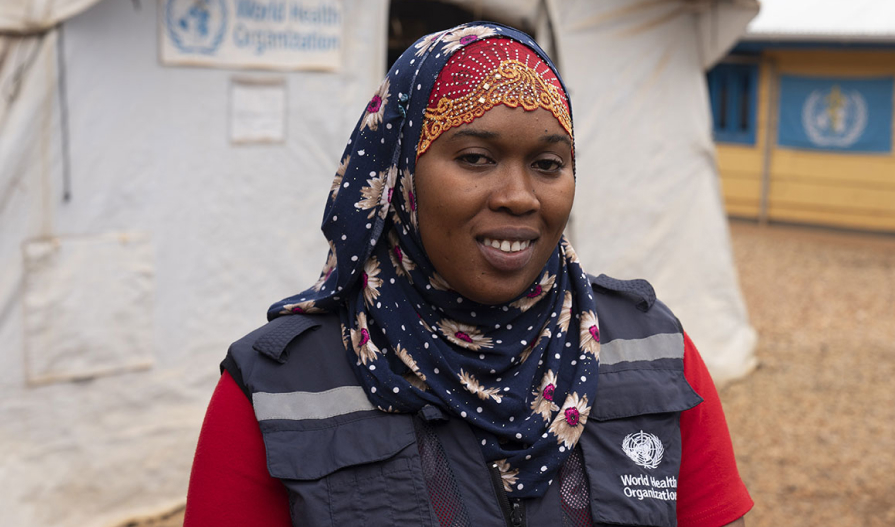
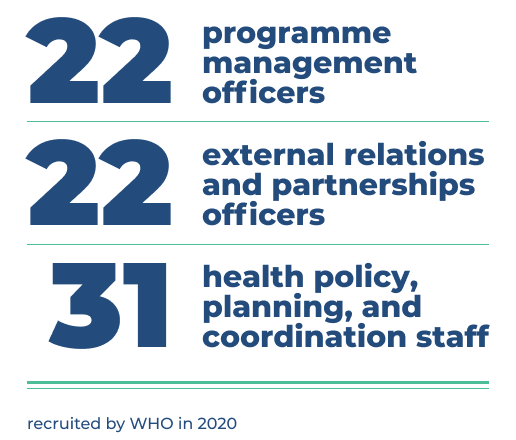
As a transitional measure, multicountry assignment teams are being formed to pool WHO’s technical support across country offices based on available resources.
To drive the functional transformation, guidance has been developed along with a web-based, systematic gap analysis tool. This tool was piloted in Botswana and Congo. Feedback from pilot countries has been incorporated and the process is being expanded to Liberia, Namibia, Niger and Uganda.
Financial, human and administrative resources managed effectively
Planning, budgeting, monitoring and evaluation
The approved WHO Programme budget 2020–2021 for the African Region is US$ 992.3 million. As of 30 June 2021, the Region has used 62.4% of the total base funds available compared to 67% as of 30 June 2019.
As of 30 June 2021
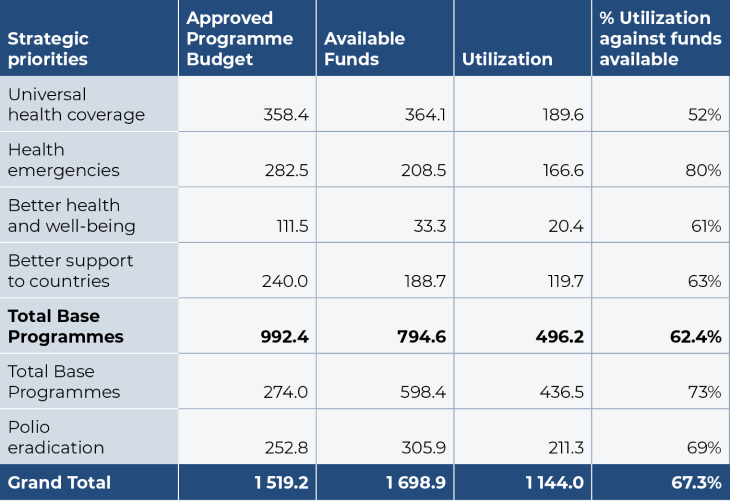
Globally, WHO has adopted the use of the output scorecard, as a standardized, transparent and impact-focused method of assessing its performance. This new method assesses progress towards technical and enabling outputs in the Thirteenth General Programme of work, in relation to five common dimensions: leadership; accountability; impactful integration of gender, equity and human rights; value for money; and achievements of results in ways leading to impact. The sixth dimension for technical outputs is “client service delivery” and for enabling outputs it is “global goods”. Figure X shows an example from output 1.3.5 which focuses on antimicrobial resistance.
To standardize measurement and minimize possible biases, the WHO Regional Office for Africa is using key performance indicators to assess the results dimension of the output scorecard. Measurement and implementation of value-for-money approaches is also being strengthened. Continuous learning has been provided though short videos and the knowledge attained is being used in the value-for-money dimension of the scorecard.
To facilitate planning, budget tracking and monitoring of implementation, the online Tool for African Region Results (TAR2) is being developed.
Progress towards gender parity,
professional excellence and care for staff
In 2021, for the first time ever, gender parity has been achieved in the executive management team in the WHO Regional Office for Africa. In addition, across the Region, the proportion of female staff occupying senior or directorial roles at P6 level and above, including heads of WHO country offices, has increased from 24% in 2015 to 30% in 2021.
In 2021, for the first time ever, gender parity has been achieved in the executive management team in the WHO Regional Office for Africa.
To build up the next generation of health leaders, the partnership between WHO and the UN Volunteers programme is expanding. There are now 125 UN volunteers contributing to WHO’s work in the African Region, doubling from 60 in 2019. Both organizations jointly launched the Africa Young Women Health Champion’s initiative (AWHC) in March 2020, which has resulted in 40 young women being brought on board. This initiative has shown that gender balance is possible in the African Region, with women representing 52% of WHO’s UN volunteers workforce in African countries.
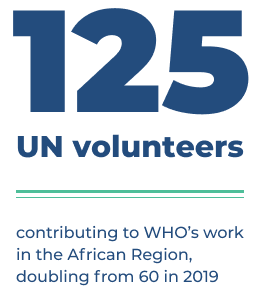
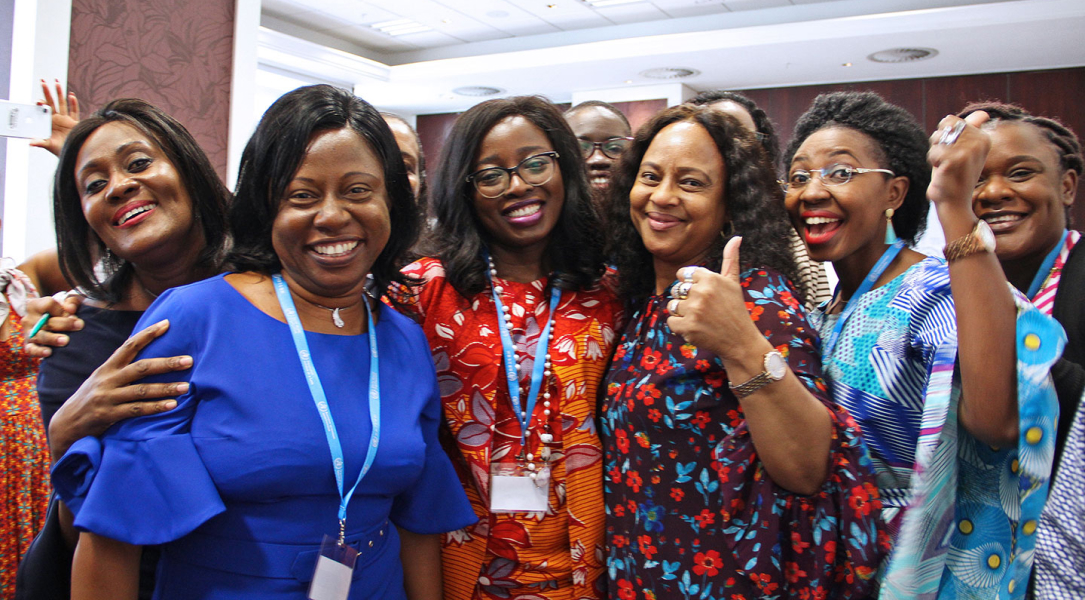
A career fair initiative is being launched to reach out to universities, research centres, professional networks, and intergovernmental institutions to further attract diverse talent as well as identify more opportunities for resource mobilization, partnerships and collaboration.
Almost 200 new recruits, including staff, volunteers and other contractors, participated in the AFRO induction programme in the past year. The induction is part of a suite of professional development activities for staff, including leadership training, mentorship, team performance and women’s empowerment initiatives.
Finally, as part of promoting a healthy working environment in the context of COVID-19, staff and their dependents as well as contractors who were infected by the virus received quality care, and prevention measures were strictly enforced to prevent further transmission. This included allowing staff to telework, providing modems and other equipment for staff to work from home, and implementing rotational arrangements to reduce the number of staff in offices. Stress counselling and psychological services were also made available to all staff and their dependents.
Risk management
Investments in risk management continue to be scaled up, for staff to understand the boundaries within which they are expected to operate, thus allowing fast decision-making and informed risk-taking. The revision of WHO’s risk appetite framework has started with discussions involving senior management at regional and headquarters level and the review of WHO’s risk taxonomy and related governance. Throughout 2021, briefings will be provided to staff in all offices to improve understanding of the Organization’s internal control framework. A briefing was also held with heads of country offices on the threats of fraud and corruption. Tools and training in these areas are being developed to reinforce staff awareness at all levels.
In 2020, three internal audits were conducted, and all were rated either satisfactory or satisfactory with minor improvements, compared with 53% in 2019 and 81% in 2018. Timely implementation of audit recommendations remains a priority. Internal audits of the Central African Republic, Niger and Congo Country Offices, and of the contracting and procurement services at the WHO Regional Office, and external audits of the Nigeria and Uganda Country Offices were successfully closed. Seventy-five per cent of all audit recommendations have been closed successfully, up from 60% in 2020.
Zero tolerance of sexual exploitation and abuse
Reports of alleged sexual exploitation and abuse by WHO staff and collaborators during the response to the 10th Ebola outbreak in the Democratic Republic of the Congo are deeply disturbing and have led to concrete actions to prevent incidents in future and to protect survivors and whistleblowers. As this was a Grade 3 global response, WHO headquarters has established an Independent Commission to investigate the allegations. This Commission is the first of its kind in the UN system and the rationale for its establishment is to ensure impartiality, transparency and full independence of the investigation.
In addition, at the regional level, intensive awareness campaigns have been conducted, with an emphasis on WHO’s emergency response operations. A focal point for the prevention of sexual exploitation and abuse is now deployed routinely to emergency settings, thorough reference checks are conducted for all experts and contractors deployed, and individuals sign a code of conduct when taking up new assignments. The Regional Director continuously reminds staff of WHO’s zero tolerance policy on sexual exploitation and abuse in all townhall meetings, encouraging staff to discuss these issues and to raise any concerns with the Ombudsperson and other mechanisms.
Managing risk using mobile money
In May 2020, the WHO Digital Finance Team was created to support polio and other health priorities in the Region, in compliance with WHO financial rules and regulations. So far, the team has supported direct payments to over 100 000 polio campaign workers in Côte d’Ivoire, Mali and Ghana. In Côte d’Ivoire a national database of nearly 45 000 health workers was created and enabled secure payments to polio vaccinators just two hours after the campaign ended.
This year the team is aiming to work with 15 countries to build a reliable ecosystem to rapidly and accurately pay health workers. This will involve establishing a task force in each country, with a standard set of operating procedures, a national database of health workers, and long-term agreements with digital payment service providers. In Kinshasa in the Democratic Republic of the Congo for example, 80 000 workers have so far been enrolled in the national database, across 23 out of 35 health zones.
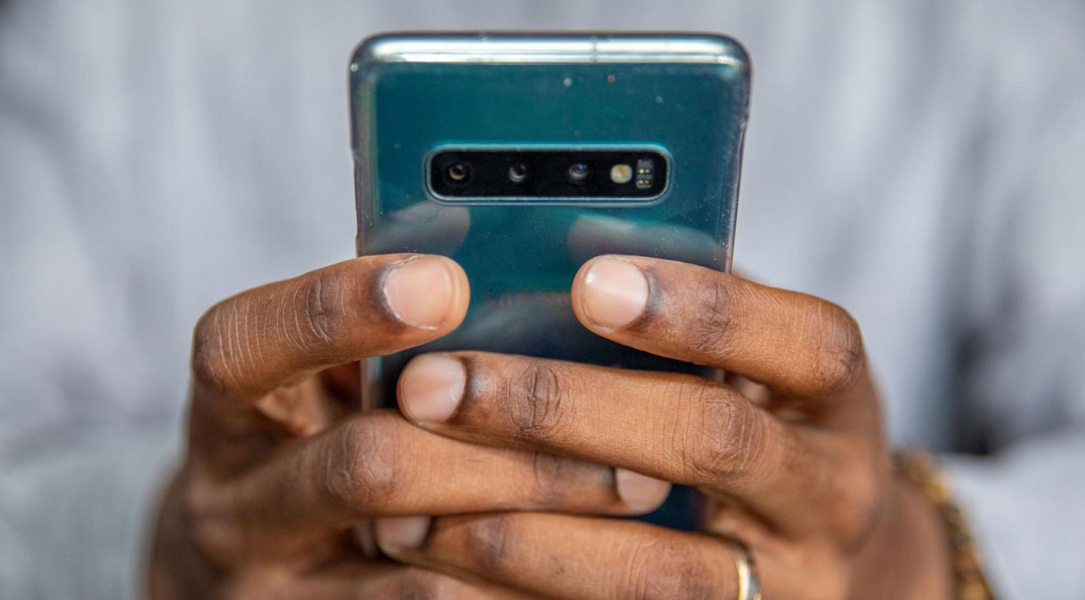
Ensuring productivity in the new normal
Teleworking support has been essential in the past year to ensure that staff are able to work from anywhere and at any time. Several tools were used to facilitate digital approvals, co-authoring documents, one-on-one and group calls, chatting, screen sharing, collaboration, virtual meetings or conferences, and remote IT support.
A significant investment has been made in providing and improving internet connectivity and providing cloud services, as the need for stable and fast internet connection has become increasingly important given that most processes are now internet-dependent, with the increasing use of cloud services. This was done through increasing WIFI access points, facilitating modems for staff and moving key applications from on-premises to the cloud.
Multilingualism and operational support
In a strong signal that it is adapting effectively to changing times, WHO in the African Region is harnessing the extraordinary potential of information technology to deliver on its mandate. Since July 2020, the information technology and interpretation services have provided support for the holding of over 400 webinars relevant to WHO’s normative, standard-setting, and capacity-building functions. This trend is expected to continue because of the enormous benefits these platforms and interactions represent in terms of cost containment and reaching a wider audience.
- Media engagements include Radio France International, CNN, Le Monde, Associated Press, the Financial Times as well as regional media: SABC, AllAfrica.com, Jeune Afrique, BBC Afrique, BBC Focus on Africa and major national media such as Kenya’s Daily Nation and Nigeria’s This Day.
- Benin, Botswana, Burundi, Cabo Verde, Côte d'Ivoire, Democratic Republic of the Congo, Eritrea, Eswatini, Ethiopia, the Gambia, Ghana, Guinea, Kenya, Lesotho, Madagascar, Malawi, Mali, Mauritius, Mozambique, Namibia, Rwanda, Sao Tome and Principe, Senegal, South Africa, Uganda and Zambia.
- Botswana, Burundi, Burkina Faso, Cameroon, Chad, Congo, Côte d'Ivoire, Central African Republic, Democratic Republic of the Congo, Eritrea, Eswatini, Ethiopia, the Gambia, Ghana, Guinea, Guinea-Bissau, Lesotho, Liberia, Malawi, Mali, Mozambique, Niger, Senegal, Sierra Leone, South Africa, South Sudan, Togo, Uganda, United Republic of Tanzania, Zambia and Zimbabwe.
- Eight countries currently have a valid CCS: Gabon, Guinea, Liberia, Mauritania, Niger, Seychelles, Sierra Leone and Zambia.


